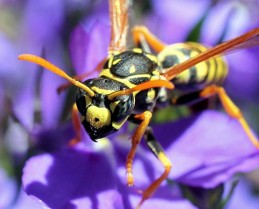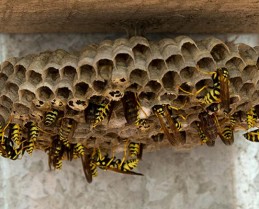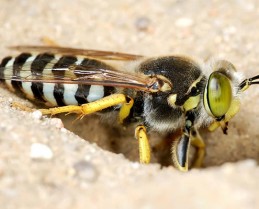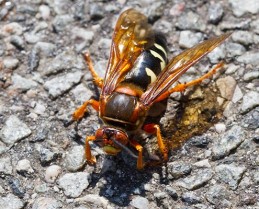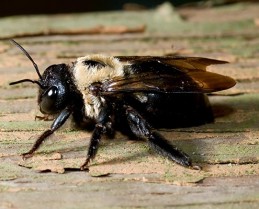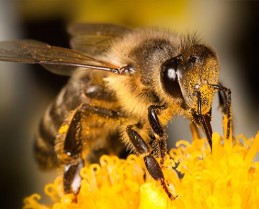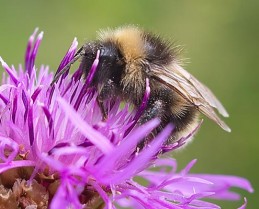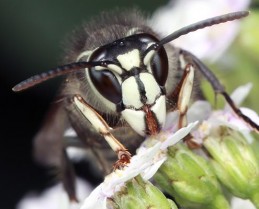Have Questions? Call Bee Control Today
If you are having a problem with stinging insects or would like to protect your home from stinging insects like hornets, wasps, bees, cicada killers or yellowjackets, Bee Control can help. We are available 24/7 for all types of emergency bee removal, elimination, and extermination situations. Call us today at (412) 765-0335.
We are ready at all times to respond to situations involving stinging insect problems. Our involvement ranges from fully comprehensive prevention applications to emergency response services.
-
Emergency
I have a nest on the inside of my house. Can’t I just plug up the entrance hole?
ABSOLUTELY NOT! This is the action we pray you don’t take as it will trap many bees or yellowjackets inside. If their entrance is plugged, the insects will look for an alternative entrance or exit which often results in them entering the property in large numbers via vents, light fixtures, etc. It should also be noted that yellowjackets can and will chew through dry wall (even plaster) from the site of a nest located in ceiling or wall cavities. It is essential to avoid this issue. If it does occur call BEE CONTROL IMMEDIATELY at (412) 765-0335.
-
Prevention
How effective is the spring prevention program?
This application is based on products developed to provide the longest average effective residual life span. We apply EPA approved non-staining materials to cracks, crevices, decks, railings, sheds, shutters, soffit/fascia, retaining walls, mulch beds and many other areas – highly favored nesting sites for all stinging insects! This means that nest building can be deterred (in or on properties) for the duration of the nest building season – normally April through June in Western Pennsylvania.
Why do I see wasps (and occasionally yellowjackets) indoors in the spring and fall?
Due to the climate in southwestern Pennsylvania, colonies of yellowjackets, wasps, hornets, and bumble bees die in the fall – but before they do, their industrious focus is on the production of new queens, which in many instances can be considerable in number. It is these queens which seek out hibernation sites and our properties offer very attractive conditions. Hence the reason that many homeowners find these insects indoors in the fall. In the spring, their appearance indoors reflects the queens emerging from hibernation.
To combat this, homeowners can seek a specialized preventative control application in the fall designed to minimize these insects gaining access to the home.
-
Response
In an emergency, how quickly can a specialist be at my home or business?
As quickly as you need us to be there. Generally speaking, an emergency demands immediate response! We are available 24 hours a day, 7 days a week. Call Bee Control Pittsburgh today at (412) 765-0335.
If I’m considering either the spring or fall Prevention program, how soon can you do the assessment and estimate?
Same day or later to suit your schedule, simple as that.
-
Safety
How safe are the application methods and materials?
Products used must be EPA approved and accepted by the PA Department of Agriculture. It is absolutely essential that any product (be it detergents, dyes, pesticides, etc.) is used strictly as labeled to ensure the safety of humans, pets, and animals.
How safe is it for you and your staff when dealing with yellowjackets, hornets, wasps, and bees?
We are safe as humanly possible, completely covered in protective overalls, hat, veil, gloves, boots and eye wear, coveralls zipped and taped tight! Despite all the precautions, particularly aggressive yellowjackets, hornets, and wasps (even bees if riled up!) can still find a weak spot on occasion.
-
Miscellaneous
There is a nest left over from last year. What should I do? Will they come back?
When wasp, yellowjacket, and hornet colonies die in the fall, the nest left behind is not reused the following year. However, other scavenging insects such as beetles can inhabit the abandoned nests so it is a good idea to have the abandoned nests removed if they have been constructed inside the property. However, if a location has proven attractive for nest building during one spring/summer, it is very possibly going to prove attractive to new queens seeking nesting sites during subsequent years. Also be aware that honey bee colonies can continue to thrive from year to year in the same nest (hive). On occasion, bumble bees can become active in the same area as previously experienced.
No matter if it’s a bee, yellowjacket, wasp, or hornet, why are people generally so scared?
This may be a reflection of a nasty experience from earlier in life, usually a sting or stings. Fear of an allergic reaction to venom also worries many people. Additionally, many instances of fear originate as a child due to witnessing adverse reactions from adults to stinging insects.
Are all properties vulnerable to infestation by yellowjackets, bees, and wasps? Or— is it just me???
It’s not you! If a queen finds a suitable location, construction and /or colonization will occur.
Is there anything I can do to help reduce the possibility of infestation?
Inspect your property carefully and seal/repair cracks, deteriorated caulking, holes, broken vents and screening (to attics) etc. It is not necessary to tear out flowers!
Why do I get stung every year when cutting the grass and weed-whacking?
Accidents of this kind are almost always attributable to colonies of ground bees (yellowjackets) nesting, yes you’ve guessed it, underground! Occasionally, bumble bees may be the culprits. The best way to reduce this type of attack is to REGULARLY check ALL areas of your yard for visible insect ‘traffic’ which is insects repeatedly visiting the same spot(s). This is particularly noticeable from July to October. You will see them entering and exiting a hole in the ground. DO NOT block it! Always remember that yellowjackets in particular will respond very quickly to vibration, movement, shadow, and artificial light. Oh, and they do NOT sleep at night! To avoid what can become serious attacks it is best to resist all do-it-yourself temptations ESPECIALLY NO GASOLINE, ETC!!!! safer by far to call Bee Control now at (412) 765-0335.

